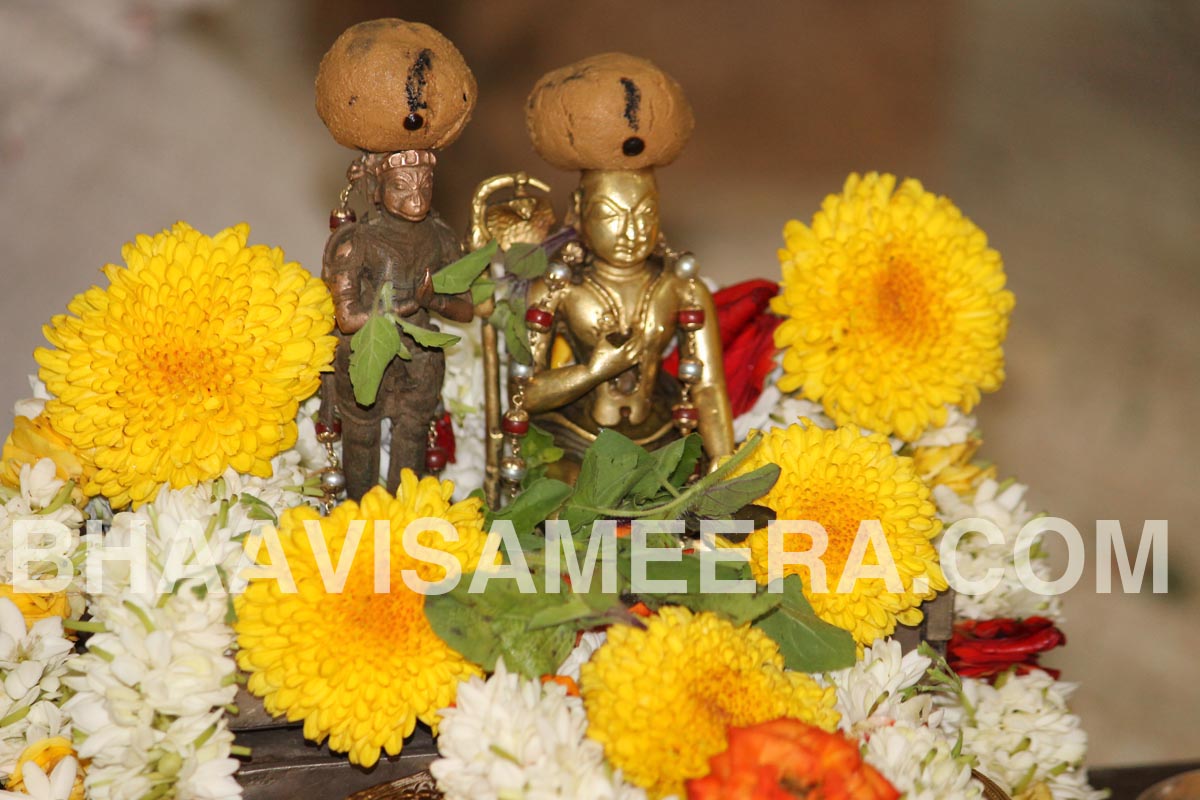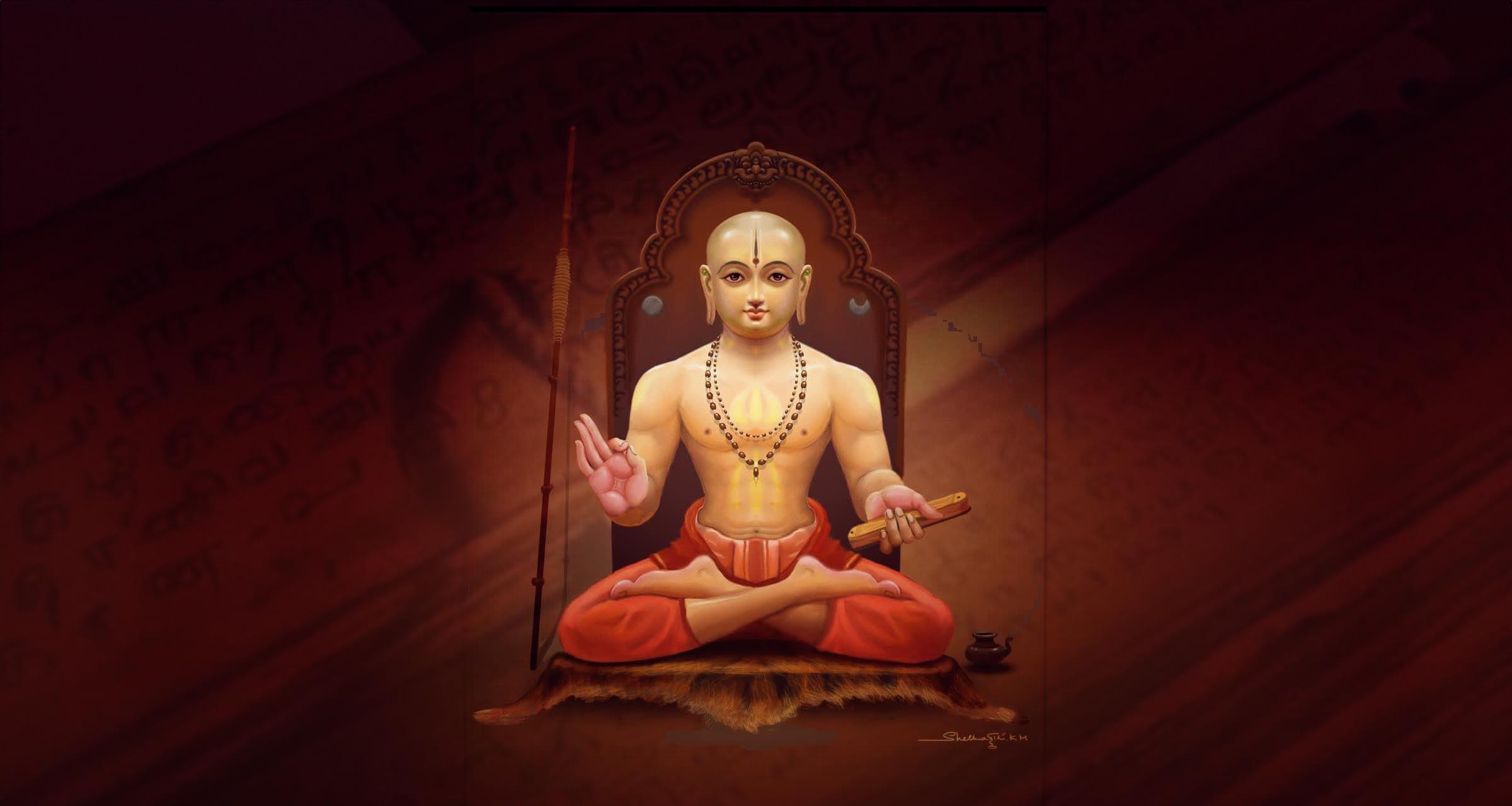Tatvavâda
The basic tenets of the Dvaitha philosophy are
- Lord Vishnu is independent and supreme in all manners
- The universe we live in is real
- The Universe, jeevas, matter and God are all real and mutually different
- There is hierarchy amongst the Jeevas
- Moksha or salvation is the realization of one’s true nature and permanent state of happiness.
- Bhakti is the way to achieve that state of Moksha
Hari Parataraha– Lord Vishnu is independent, supreme and full of auspicious qualities. No one or nothing can ever equal him in any manner. Everyone including Goddess Mahalaskhmi is dependent on him for thriving. All are powered by him through his grace
All names of God connote his qualities. For e.g. Sheshashayi means the God who is asleep on a serpent. But the inner meaning is that he is the God who is above death, as serpent connotes death. Hence God is indestructible and above the cycle of life and death.
Satyamjagat– The universe around is real. It is not a virtual world. If the world was to be virtual, nobody would be serious about the same. Great devotees such as Prahlada and Dhruva achieved greatness by believing in this aspect of the universe. Thinking of God and the world to be real fills our lives with meaning and sense of purpose. Thinking of God in this manner enlarges our perspectives. Knowledge of God gives knowledge about everything else. It motivates us to lead meaningful lives. All things in this world are energized by God and manifests in their existence, knowledge and activity.
Tattvobheda– The Universe, Jeevas, matter and God are all real. They are mutually different and that difference is real. All men are born different and die differently.
Jeevaganaha Nichochabhavangataha– There are three types of Jeevas based on their nature-Satvika, Tamasa and Rajasa. It is not possible to know as to which ‘type’ one belongs to as long as one is in this world. A Jeeva belonging to a particular type will always remain that way and that does not change with time. For e.g. a person who is a Satvika will always remain so.
Muktirnaijasukhanubhootihi– Everyone aspires to be permanently happy and have no sorrows. But that state of permanent happiness is not possible in this mortal (temporary) world, just like a person cannot aspire to have a permanent job in a temporary organization. The realization of one’s true nature (satvika or Tamasa or Rajasa etc) is called Moksha. Moksha may be of two types. For the virtuous people, it is called Mukti or a state of permanent happiness and for the evil it is called Tamasa or state of eternal sorrow and darkness.
Amalabhakthi Tatsadhanam– In order to attain Mukthi, one has to have Bhakthi. Bhakthi is love and Knowledge of God. Love for younger people (people below us) is called Vatsalya (affection), love for peers is called Maitri (friendship) and love for people superior to us is called Bhakthi (devotion). Bhakthi should not be mistaken for emotions. Acts like crying, shouting, dancing etc are not Bhakthi. Only love expressed towards God with knowledge of his virtues is Bhakthi (as defined by Sri Jayateertha). The true test of Bhakthi is it’s firmness (sudhruda) and the enjoyment that it gives to the devotee (sadhaka). Both these come through knowledge.
Proof for acceptance
There are three types of proofs for accepting anything as a fact:
- Pratyaksha – Perceptions from all senses
- Anumana- Inference from observations (not to be mistaken for anumana as doubt)
- Agama- Knowledge through establishes and accepted scriptures
One has to carefully examine all aspects using the above three criteria to establish if an observation is a fact or not. But Sri Madhvacharya says while these should be used, the ultimate examination lies in one’s conscience (Sakshi). Our conscience never fails to give us the correct answers and is called the Superproof.
As is the practice, one needs a laboratory to examine the validity of anything. The world is a laboratory to establish facts one learns from philosophy.
Conduct, Knowledge and Offering
- For Bhakthi, both conduct (achara) and knowledge (Vichara are essential). Just like there are two criteria for selection of a person for a job-merit and conduct, a person wanting to grow Bhakthi in him should have both Achara and Vichara.
- The last step in attaining Bhakthi is to offer the fruits of one’s karma at the lotus feet of God. God does not demand anything from anybody as he does not need anything. But accepts whatever is submitted to him as offerings with devotion.
- This is just like a student has to have the right knowledge (vichara), right conduct (achara) and submit his answers to the right invigilator (God) to get the right fruits (Mukthi).

